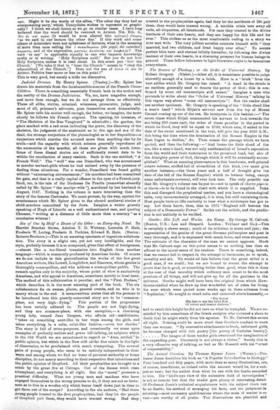Six of One by Half a Dozen of the Other
: an Every-day Novel. By Harriet Beecher Stowe, Adeline T. D. Whitney, Lucretia P. Hale,
Frederic W. Loring, Frederic B. Perkins, Edward E. Hale. (Boston :
Roberts Brothers.)—This is an amusing specimen of ingenious collabora- tion. The story is a slight one, yet not very intelligible, and the style, probably because it is so compound, gives that effect of foreignness, —almost like a too-literal translation into English from another language—which is commonly produced by American books. Of course we do not include in this generalisation the works of the few great American writers, like Lowell, Longfellow, and Emerson, whose genius is thoroughly cosmopolitan, and who address a cosmopolitan public. The remark applies only to the majority, whose point of view is exclusively American, and who appeal to American, sometimes merely to local taste. The method of this collaboration is peculiar, and the "First Preface," which describes it, is the most amusing part of the book. The six collaborators fix on names, places, general events, and on who is to marry whom in the end. A memorandara states that all the persons to be introduced into this queerly-concocted story are to be "common- place, not very high - flying." This portion of the programme has been strictly adhered to. The people are not high-flying, and they are common-place, with one exception,— a charming young lady, named Jane Burgess, who affects old - maidialiness, " takes on something aunt-like in her ways among the girls, and takes everything in a calm, saint-like fashion,—even her shocks." The story is full of cross-purposes, and occasionally we come upon examples of perfectly serious and grave tall-talking, bn subjects which in the Old World we are accustomed to regard as "done, settled," in public opinion, but which in the New still strike fine minds in the light of discoveries, to be proclaimed with much trumpeting. The several pairs of young people, who seem to be entirely independent in their ways, and among whom we find no trace of parental authority or home discipline, do not marry according to their respective first intentions and ' the public opinion of Greyford. All their perplexities are brought to a crisis by the great fire at Chicago. Out of the flames truth rises triumphant, and everything is all right. But the "moral" presents a practical difficulty. What are young mon and maidens who have engaged themselves to the wrong persons to do, if they are not so fortu- nate as to live in a wooden city which burns itself down just in time to get them out of the scrape? According to the six authors, "Had these young people trusted to the first propinquities, had they let the people of Greyford pair them, they would have trusted wrong. Had they trusted to the propinquities again, had they let the accidents of life pair ' them, they would have trusted wrong. A terrible crisis tore away all veils, all etiquettes, all falsehoods. For once tbey trusted to the divine ' instincts of their own hearts, and they are happy for this life and for , ever." This strikes us as the most comfortable ending to a story we ever met with. The very jolliest novelist contents himself with "they married, had two children, and lived happy ever after." To secure perfect bliss here and eternal felicity hereafter, by following the divine instinct of their own hearts, is a charming prospect for human beings in general. These fellow-labourers in light literature ought to be favourites every where.


































 Previous page
Previous page